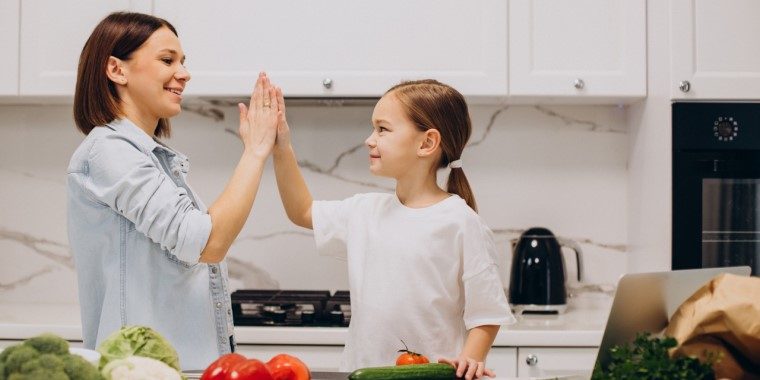10 key ideas to pass on to your children in the kitchen
Cooking can be a space for fun, learning and knowledge development for the youngest children, as well as encouraging healthy behavioural habits for them, society and the environment.
Summer is coming to an end and with it, the holidays. The children return to the school routine, the home returns to its daily rhythm and the kitchen takes centre stage again, becoming that family meeting place where the most interesting things happen, an occasion to be together and to share moments, some of them very special, that go beyond cooking.
An occasion to be together and to share moments, some of them very special, that go beyond cooking. Have you ever stopped to think about how many really important ideas the little ones can learn in a kitchen?
- The value of knowledge: cooking is the means not only to acquire valuable knowledge in a practical way, the best way of learning according to specialists, but also to be aware of its importance in the real world. Mathematics (measurements and fractions), science (changes in the state of matter, physical and chemical reactions…), and geography (discovering ingredients from different regions and countries) … are some examples. Take advantage of their curiosity to introduce them to a taste for learning.
- Health and self-care: The kitchen is the perfect place to teach children about different types of food and healthy eating, a skill that will stay with them forever and help them to stay healthier, take care of themselves in an active and responsible way and have a better quality of life.
- Gastronomic culture: The traditional recipe book is a cultural asset of a community that we cannot lose and the way to protect it is to pass it on from generation to generation, also encouraging creativity and imagination in the kitchen.
- Collaborative work: Cooking as a family, as well as promoting communication between parents and children, develops empathy and encourages teamwork. The idea is to divide up the tasks so that everyone works together to achieve a common goal: the preparation of a delicious meal or a favourite dessert. And then celebrate.
- Sustainability: through seasonally appropriate recipes using seasonal ingredients. Encourage the use of sustainably produced and local food by explaining to children the health benefits for individuals, societies and the environment.
- Responsible consumption: learning to manage food when buying, preserving and cooking, as well as avoiding waste, is the best way to save, but above all to teach the value of food, beyond the economic value.
- Circular economy: Closely related to the previous point, the kitchen is the best place to learn not only to recycle but also to reuse and reduce. Remind your children that resources are limited and that we cannot waste them. The circular economy also involves sharing, a very important value for children to learn.
- Solidarity: showing your unconditional support for other people’s causes or interests, especially in difficult or compromising situations. Take advantage of the kitchen to develop a more supportive side by collaborating, for example, with a food bank.
- Safe environments: safety is an essential requirement in the kitchen. Teach children about safe handling of utensils and appliances in the kitchen, as well as precautions when handling hot objects and food. Sooner or later they will have to deal with it and it will be better if they are prepared.
- And don’t forget to talk to them about the importance of cleanliness and hygiene in the kitchen and food: handling them in the right way will help protect them from the most common food-borne diseases.
Health, culture, science, empathy and teamwork, the fight against waste, sustainability, solidarity and security…. Make the most of the time you spend together to give your children these valuable tools that will stay with them for the rest of their lives.
